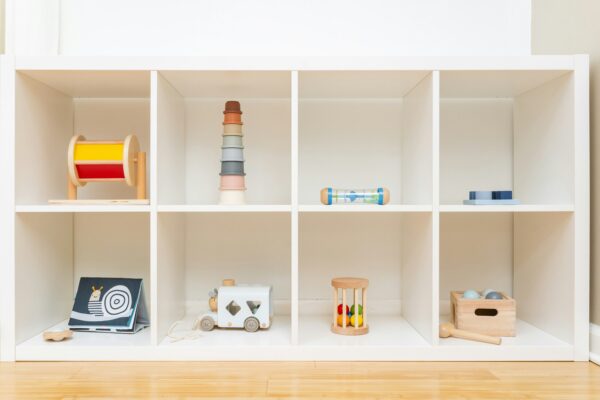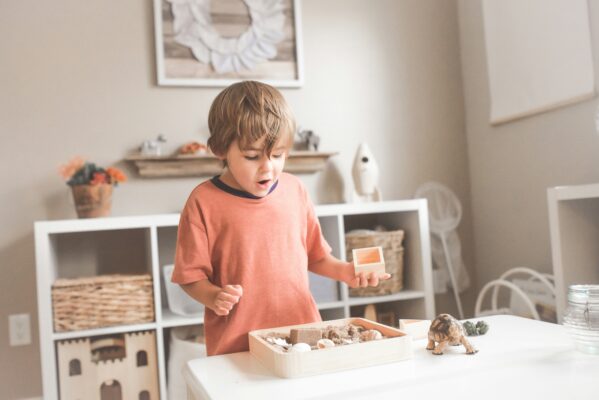Introduction: Exploring the Significance of Play in Child Development
Play is not just a leisure activity for children; it’s a vital component of their growth and development. Through play, children learn about themselves, their environment, and the world around them. It helps in building cognitive skills, fostering social interactions, and developing fine and gross motor skills. In today’s fast-paced world, where technology often dominates, the importance of traditional, hands-on play cannot be overstated.
In this blog post, we’ll explore how Montessori toys can be a game-changer in your child’s developmental journey. We’ll delve into the principles behind Montessori toy selection, recommend top Montessori toys for various developmental stages, and discuss the benefits of a minimalist approach to toy consumption.

Understanding Montessori Principles in Toy Selection
The Montessori method, founded by Dr Maria Montessori, emphasises hands-on learning and self-directed activity. Montessori toys are designed to support this philosophy by being simple, realistic, and rooted in nature. They encourage children to explore, manipulate, and learn at their own pace. Here are some key principles of Montessori toy selection:
- Simplicity and Focus: Montessori toys are typically free from unnecessary embellishments. This simplicity helps children focus on the task at hand without distractions.
- Realism: Toys that reflect real-life objects and activities help children understand and relate to their environment better.
- Natural Materials: Montessori toys are often made from natural materials like wood, metal, or fabric, which offer different textures and weights, stimulating the senses.
- Purposeful Design: Each toy serves a specific developmental purpose, whether it’s to improve fine motor skills, encourage problem-solving, or foster creativity.
Top Montessori Toys for Different Stages of Child Development
Infants: Toys that Encourage Exploration and Sensory Development
- Wooden Rattles: These help in developing grasping reflexes and improve hand-eye coordination.
- Soft Fabric Balls: Perfect for squeezing and rolling, these balls aid in sensory development.
- Mobiles: Hanging mobiles with simple, contrasting colours stimulate visual tracking.
Toddlers: Toys that Foster Independence and Fine Motor Skills
- Stacking Rings: Teach toddlers about different sizes and improve hand-eye coordination.
- Shape Sorters: Help children understand shapes and develop problem-solving skills.
- Pull Toys: Encourage walking and coordination, fostering a sense of independence.
Preschoolers: Toys that Promote Cognitive Skills and Creativity
- Building Blocks: Enhance spatial awareness and creativity.
- Art Supplies: Items like coloured pencils, paper, and clay boost creative expression.
- Puzzles: Develop critical thinking and problem-solving abilities.

The Benefits of Minimalist Toy Approaches for Children and Parents
Stimulates Imagination and Creativity
Fewer, well-chosen toys encourage children to use their imagination more. Without the overwhelming choice of many toys, children can explore the full potential of the toys they do have, fostering creativity and innovation.
Encourages Learning Through Play
Montessori toys are educational by design. They make learning a natural part of play, encouraging children to explore concepts like numbers, letters, shapes, and colours in a fun and engaging way.
Promotes Sustainable and Ethical Practices in Toy Consumption
Minimalist and Montessori-inspired toy selections often focus on quality over quantity. This approach not only reduces clutter but also supports sustainable living by choosing durable, eco-friendly toys that last longer and have less environmental impact.
Tips for Introducing Montessori Toys at Home
Creating a Play Area that Encourages Exploration and Independence
Designate a play area that is safe, accessible, and organised. Low shelves with neatly arranged toys allow children to choose and return items independently, fostering a sense of responsibility and order.
Rotating Toys to Maintain Interest and Engagement
Rather than overwhelming your child with too many toys at once, rotate them periodically. This keeps the play environment fresh and exciting, and allows children to fully engage with each toy.
Involving Children in the Selection and Care of Toys
Involve your children in choosing and caring for their toys. This teaches them to value and respect their belongings, and provides an opportunity for you to discuss the principles of minimalism and sustainability.
Conclusion: Emphasising the Role of Play in Nurturing Well-Rounded Children
Play is an essential part of childhood, offering countless opportunities for learning and growth. By choosing Montessori toys and adopting a minimalist approach, parents can create an enriching play environment that supports their child’s development in a holistic way.
Encourage your children to explore, learn, and grow through play. The benefits of a minimalist and Montessori-inspired approach extend beyond childhood, fostering lifelong skills and values.
We’d love to hear your thoughts and experiences with Montessori toys. What are your favourite Montessori-inspired toys? How have they impacted your child’s development? Share your stories in the comments below!
Let’s unlock the power of play together!

